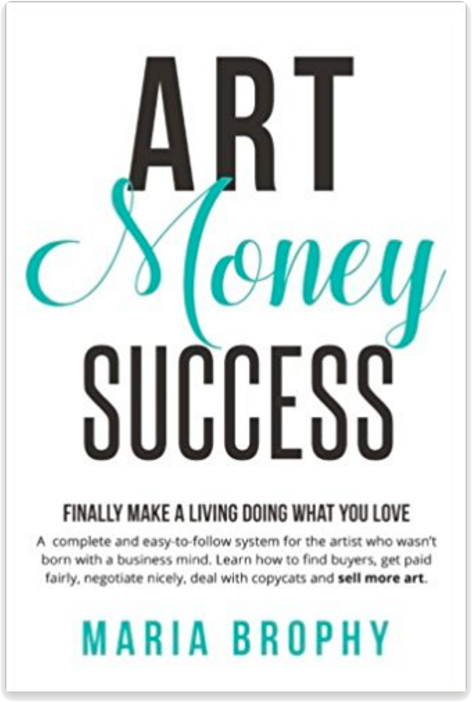“In business a reputation for keeping absolutely to the letter and spirit of an agreement, even when it is unfavorable, is the most precious of assets…” Lord Chandos
Often I get this question from my entrepreneurial friends: “How do you avoid getting into a bad business deal?”
My smarty-pants response is “Don’t sign deals with the wrong people!”
But here’s my long, respectable answer:
Before entering into a deal with someone, do your homework.
Because if things go wrong down the road, well, don’t come crying because I’ll tell you what I tell myself: it’s probably your own fault.
Like the situation I have with Start Mobile. We signed a contract to use Drew’s images for mobile downloads. But they weren’t sending us payments. There were always excuses which sounded good at the time. But after months of this, I made a final attempt to straighten it out, and got an explanation that didn’t feel right to me.
Frustrated, I called two other artists who also had a deal with this company and they both told me the same story; they hadn’t been paid. My call was over a year too late; had I contacted the artists BEFORE signing the contact, I wouldn’t have entered into it.
I promptly canceled the contract and Start Mobile was legally obligated to remove all downloads from the web.
So imagine my surprise this morning when I did a search online and found that they are STILL selling Drew’s art, without authorization!
I have no one to blame but ME. Why, you ask?
Every one of us is responsible for all that happens to us, good and bad. (I love this belief because it gives me greater control over everything in my life.)
In this instance, I should have done my “vetting” BEFORE signing the contract and handing over the art in the first place. (Lesson learned)
Sometimes we get so excited about an opportunity that we forget to do our homework.
Luckily, I’ve only had a few deals go bad over the years, each for a different reason, and looking back I see that sometimes the problem was lack of doing detective work BEFORE going into it.
EXAMPLES OF DEALS GONE BAD
1.) NON-PAYMENT: The client just doesn’t pay you. I’ve avoided this most of the time by using a 50% down or Advance required policy. Read my post called How to Never Get Ripped off Again to learn more about this wonderful policy.
2.) CONSISTENT LATE PAYMENT: The client pays 60, 90, 120 days late, consistently.
3.) CLIENT GOES OUT OF BUSINESS after you did a lot of work for them (before they paid you): An advance or deposit prevents this as well.
We once did a deal with one of the oldest and largest (and secure) toy companies in America and they went bankrupt 2 months later. Luckily, we had required a $5,000 advance so we got paid for our time.
4.) CLIENT DOESN’T RESPECT THE TERMS OF THE AGREEMENT or they butcher your work: A good written agreement will prevent this.
PREVENTION IS THE CURE
The best way to deal with bad situations in business is to prevent it from happening in the first place. It’s up to YOU to make sure you aren’t “taken advantage of.”
Practice “SAFE DEAL MAKING” with the following precautions:
1.) MOST IMPORTANT FIRST: DO YOUR HOMEWORK: This is your greatest and easiest tool. Contact others who have done business with this person/company, and call them for a referral.
Before going into a deal with Nirve Sports for Drew’s beach cruiser bikes, I called Paul Frank Industries, who had been doing business with them for years. They gave a positive referral, and we are now in our 6th or 7th successful year with Nirve Sports.
2.) LISTEN TO YOUR GUT AND FIRST IMPRESSION: My gut often warns me if someone’s not legit. However, your gut is not always fool proof. That’s why doing your homework is number one.
3.) IF THERE’S FRICTION FROM THE BEGINNING WALK AWAY: If a deal or relationship is difficult from the beginning, it’s a great indicator that it is only going to get harder with time. Walk away.
4.) USE WRITTEN AGREEMENTS: You don’t have to be an attorney (or hire one) to put something in writing. I’ve written about the Three Reasons to Use a Contract to help people understand that you should put every agreement in writing, even those with friends and family members.
The magic of writing down what you agree to is that when both parties see it in writing, they know exactly what they are agreeing to.
This prevents misunderstandings later. The agreement, in writing, will come in handy later should someone “forget” what they agreed to.
“A verbal contract isn’t worth the paper it is written on.” Sam Goldwyn
Some people make the mistake of TRUSTING EVERYONE, and others make the mistake of TRUSTING NO-ONE.
The problem with blindly Trusting Everyone is that you don’t make decisions based on logic, but rather on impulse.
The problem with Trusting No-One is that you miss out on great opportunities by being paranoid.
Find the middle ground instead. Use your head.
I’d say that 90% of the people I’ve worked with over the years have been enjoyable to deal with. There have only been a few bad apples.
I never start a conversation with a new client with a negative thought in my mind. I always begin with enthusiasm and excitement, but still do my homework and take precautions.
Choosing who to work with is like finding the perfect DSLR camera. You do your background checks, you go online and see what others are saying about it, and you make a decision based on the evidence you gather.
And if you do fall into a “bad” deal, don’t let it bother you too much. Instead, learn from it, analyze how you ended up in that situation, and then never make that mistake again.
Here’s to your success! Maria xxoo
.
Would you like your own licensing agreement template that you can use again and again? My new LICENSING AGREEMENT/CONTRACT TEMPLATE PACKAGE is now available. This package makes it easy for you! Complete with a template that you can change as needed, and instructions, this is the perfect short, simple agreement for artists not yet ready to hire an attorney. More details here: http://store.drewbrophy.com/










14 Responses
Great advice:) Thanks!
Hi Maria –
love the pink bike picture*
Excellent & true advice.
Sometimes it is the very reputable galleries / companies that go bankrupt.
I had a situation where the gallery was not returning my calls (locations in SF & NYC)- I went to the gallery and found it boarded up, under construction! After investigation, I learned my paintings (and those of other much bigger name famous artists) were being detained in a warehouse as payment for the galleries debts! What!? I discovered where the mystery warehouse location was and drove there with a tough no-nonsense friend. I had all my contracts in hand, and we asked for my paintings back. I was told this was not possible by the front desk attendant, this was a bankruptcy and all assets had been seized.
We insisted they return my property. We suggested calling the police over stolen art. Thankfully, I got my paintings back and learned a Huge lesson. No matter how big the gallery, how exciting the opportunity, how much you know this person,,, have written contracts at a minimum.
And as you so wisely state, do your research and be informed.
Hi Maria,
Thank you so much for sharing your expieriences I KNOW some of these things I never would have thought of on my own!
Your 4th point about the client “Butchering” your work gave me a bit of a chill!! If someone can do this to such a well known and respected artist as Drew us little fishies must be in trouble 🙂
What kind of experiences have you had with this? If you don’t mind sharing what kind of wording in a contract could prevent this? Have you ever taken a deal knowing Drew’s work would be butchered because you needed the money/contacts? If so did you work out a deal where they didn’t use his name on the product or did you cop the expeirence on the chin??
Thank you again for sharing! Your advice and articles of inspiration are as always invaluable!
Marie, this was another great article! I save each and everyone one of them. They’re going into my “Real Life Business Tips That Work” binder! 🙂
Just like you say, I am very glad that I always insist on having things in writing. I am currently using an attorney to get a gallery to pay me. It is to my advantage to have written documents if this thing goes to court. I now think back at how hard I had to push to get things written down by this guy, and how that should have been an indication to begin with. I completely agree with you when you say “Every one of us is responsible for all that happens to us, good and bad.” Only by owning up to my responsibility in getting into this bad situation, have I been able to take steps to get out of it. I’ve learned so much.
Alex, that is a great point that you made – when dealing with a gallery or someone who resists putting something in writing – that is a HUGE RED FLAG! If someone isn’t willing to agree on paper, somethings’ up….you might want to walk away from that deal before you get hurt.
Hi Maria! Yes, I’ve learned that I will have to focus on all the important business stuff BEFORE I let myself get swept up by the excitement of the opportunity. I think we all wear many hats in order to make our art and sell it. Sometimes I feel like a mechanic, an entertainer, an outsider, a critic, an accountant, a magician, a director, etc. It’s my director’s hat that helps me to deal with business issues. I have had to learn that I am equal to all those I do business with. And that I actually make it possible for tons of people to have a job in the art world. Many artists don’t think about this, but everyone from the person that answers the phone at an art foundation to the person who cleans the gallery, from the museum curator to the literary agent, from the record company to the photography lab – they all have jobs because of artists. Isn’t that great?
Hi Maria,
I’m a new entrepreneur launching an origami greeting card concept at the National Stationery Show in May. My artists and I are new to the world of art licensing and want to do right by each other. I read that greeting card art royalties range from 2-5% on a copyright lawyers blog. I suggested to my artists that we begin at entry level 2% because we’re all untested commodities. Royalty free right for nonexclusive use of their art on my origami greeting cards with a two-year duration allowing for renegotiation on or before expiration. How does this sound to you?
Linda, thanks for the comment. I think 2% is extremely low. The typical royalty rates for paper goods and greeting cards ranges from 10-15%.
Our first greeting card license was 18% (I thought that was high – but the volume of sales was very low, so it made sense).
A 2-year term is good – and always there is room for re-negotiation after a contract ends and you are creating a new one.
I wish you great success with your new line!
Thanks for taking the time to answer my post, Maria. It’s great getting input from people who’ve been in the business. Mahalo!
Couldn’t agree more with you. A person is fully responsible for what happens to he/she. It’s just the best policy for life :). Your post is awesome! Thank you for consistently sharing your views and lessons learned.
I’ll right away take hold of your rss as I can not to find your e-mail subscription hyperlink or e-newsletter service. Do you’ve any?
Kindly permit me realize so that I may just subscribe. Thanks.
Great website, thank You !!